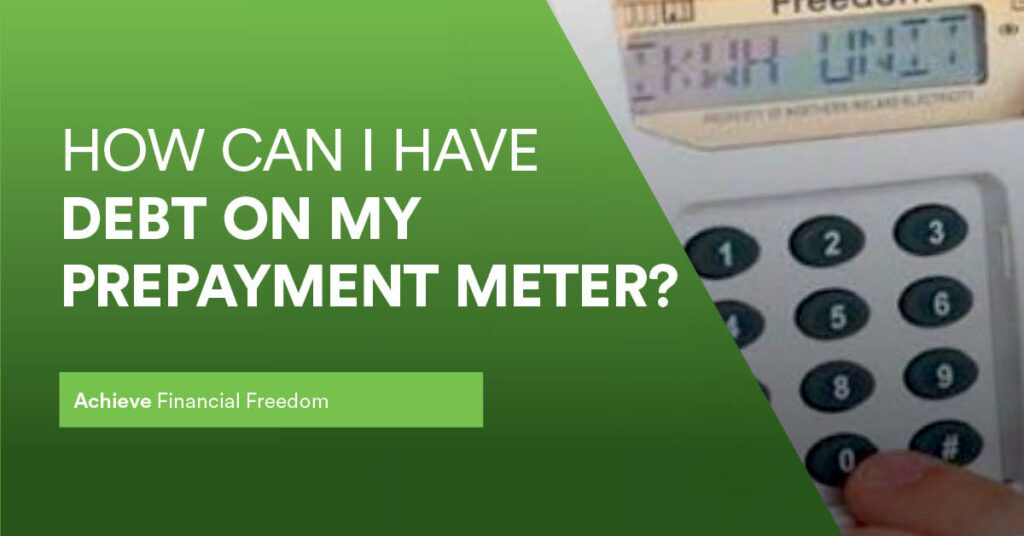I was recently contacted by a reader asking why they were in debt, “How can I have debt on my prepayment meter?” As they are on a prepayment tariff, they were unsure how this could be in debt. It can and does regularly happen, so below I explain why you might have debt on your prepayment meter and how you can confirm how much you owe.
If you’ve any consumer questions about your bills, please feel free to contact me via the foundered contact page.
Why might you be in debt on your electricity prepayment meter?
There are a few reasons why you may be in debt on your prepayment meter. These include:
- Charges for installation of your meter
- You have used your emergency credit
- You are on a repayment plan
- You have just moved into the property
Reasons why you may be in debt on an electricity prepayment meter?
It’s important to note, that when you have debt on your meter, you are liable for the payment to clear the balance. Whenever you top up your meter, this debt will be cleared first and foremost and any remaining balance will be added to as credit.
Installation of your prepayment meter
Many suppliers choose to waive the cost of installation of a prepayment meter, however, if you fail to pay for your electricity and the supplier requires a warrant to install the meter, then it is more likely that they will charge you for the installation.
It’s important to note that your electricity supplier can’t move you to a prepayment meter or prepayment smart meter if you’re disputing the money they say you owe. However, if you do owe money and choose not to repay this and you refuse to have a prepayment meter or prepayment smart meter installed, then your electricity supplier could cut off your supply.
You have used some of your emergency credit
If you check your meter, it will tell you if you have used your emergency credit and how much you have used. It will include any missed payments for standing charges or planned payments.
When your credit falls to a certain level – often £1 credit, your Keypad meter will emit a low-volume warning sound for 2 minutes. This is a warning for you to top up the credit on your prepayment meter.
You have used all your emergency credit
Once you have reached the limit of requiring emergency credit, the supplier will generally release a balance of credit to your account. You may need to switch off the warning sound and acknowledge that you need to access this credit, but once you do, this will be allocated to your meter.
Once you use all your emergency credit, a continuous sound will emit from your meter until you top up your meter. When doing so, you must repay any emergency credit you’ve used, debt repayments and standing charges. If you don’t buy enough credit when you top-up, many suppliers will allocate a percentage of your top-up to the debt and then the remaining balance will be available for you to use.
You have missed paying your standing charge or a debt repayment
Even if you aren’t using electricity within your property you will still likely be accruing a standing charge in line with the contract of your energy supplier. However, many electricity suppliers will only accept emergency credit with a manual action (often to silence the credit low alarm). If you do not accept the emergency credit, your electricity will switch off eventually.
If you did not have enough credit to cover a standing charge or debt payment, this would be added to any debt that you currently owe.
You have set up a repayment plan
If you have set up a repayment plan for previously accrued debt on your electricity prepayment meter then this will be presented on your electricity meter. Any payments you make for credit on your prepayment meter will include payment towards any repayments you must make.
You have just moved in
If you have just moved into your property then costs may still be accruing on the previous contract with your electricity meter. Get in touch with your electricity supplier and provide them with all the relevant details they require. This will ensure you are only liable for the charges relevant to your time within the property.
You have been on holiday
It is important to check your credit before you go away. Not only will daily standing charges and debt repayments continue in your absence. Even though you aren’t at home, appliances such as fridges or freezers will continue to draw electricity.
If you run out of credit, and there is no one around to start the emergency credit and your supply will stop. It is therefore incredibly important to make sure you’ve got enough credit to last until you get back.
What happens if I run out of emergency credit?
Many suppliers offer a bit of additional “friendly” credit when you run out of emergency credit when it would be hard to purchase credit for your electricity. This should give you enough time to buy a top-up. SSE Airtricity offer friendly credit in the following times and other suppliers follow a similar pattern.
- Weekdays – If your emergency credit runs out after 4 pm,
- Monday to Thursday, the supply will stay on until 9 am* the following day.
- Weekends – If your emergency credit runs out after 4 pm on a Friday, the supply will stay until 9 am* the following Monday.
- Holidays – Friendly credit will not run out on the following Public holidays: 1 January, 17 March, 24, 25, 26 & 31 December.
- Electricity supply will stay on until 9 am* on a bank holiday Monday.
Always remember the next time you buy electricity, the amount of emergency credit and friendly credit used will be deducted from your balance.
Recap
If you have debt on your repayment meter, it’s important to note that the costs of this will be removed from any future payments. There are many reasons why this may be added to your account and understanding them is the first step to avoiding them entirely.
If you find yourself in debt with your electricity supplier and unable to pay, then the first and only advice I will give is to speak to your energy supplier. You may be overcharged or there may be opportunities to work to repay this debt in a mutually beneficial manner.
After that consider creating a budget or looking at ways to save money to give yourself the headroom in your finances to stop this happening again.
If you want to ask a question similar to this, head over to my Twitter and I will do my best to answer as many of them as possible.
Frequently asked questions
Can bailiffs force entry to fit a prepayment meter?
There has been considerable coverage of bailiffs gaining a warrant to enter homes and installing prepayment meters or changing smart meters to the prepayment setting.
Bailiffs cannot force entry to your home without a court warrant, but once this is received, they are legally allowed to enter your property. This primarily happens when you don’t pay your bills.
Due to the recent negative press coverage, a number of the major energy suppliers have taken steps to suspend their applications for warrants.
What are smart pay-as-you-go meters?
Smart pay-as-you-go meters are the latest generation of prepayment meters being installed by electricity companies. The function of smart pay-as-you-go meters is similar to other smart meters in that you have the ability to view your usage at any time via the display on the meter.


